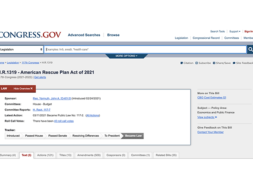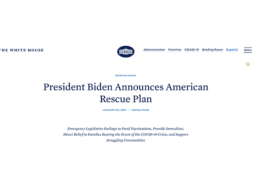
Negotiated Rulemaking Committee on Affordability and Student Loans – Session One
By Devin Miller, Director of Communications, Career Education Colleges and Universities (CECU)
The following is a summary of the first session of the U.S. Department of Education’s negotiated rulemaking committee on Affordability and Student Loans that took place on Oct. 4-8, 2021. Some of the information may have changed during the second session held on Nov. 1-5, 2021. For the most up-to-date information, CECU members can access Government Relations updates here www.career.org/grarchive.html.
In early October, the U.S. Department of Education’s negotiated rulemaking committee on Affordability and Student Loans convened for the first of three sessions to consider changes to various regulations under Title IV of the Higher Education Act, including borrower defense to repayment, closed school discharge, and pre-dispute arbitration agreements.
Many of the positions and recommendations presented on the first week were adversarial to the proprietary sector.
Despite these challenges, the primary negotiator representing proprietary institutions, Jessica Barry, President of The Modern College of Design, did an excellent job presenting and offering solution-oriented proposals that were fair for both students and institutions. Ms. Barry was supported in this effort by the alternate negotiator for the sector, Carol Colvin, Senior Vice President of Financial Aid at South College.
Day 1 of Negotiations
Newly sworn-in Under Secretary of Education James Kvaal provided welcoming remarks on behalf of the Biden Administration on the first day of negotiations. Mr. Kvaal stated that the administration has an ambitious vision for rebuilding higher education around student success and that he and the Secretary are committed to taking a fresh look at a range of regulations to eliminate unnecessary barriers. Mr. Kvaal underscored that the administration looks forward to working with the committee to achieve this goal. The Department appeared to enter these negotiations with an open mind.
Total and Permanent Disability
The first substantive topic the committee tackled was the total and permanent disability (TPD) discharge process. The current TPD regulations allow borrowers to have their federal student loans discharged based on a disability determined by select government agencies or based on a physician’s certification. Borrowers who are granted a TPD discharge based on the Social Security Administration’s determination that the individual is disabled or a physician’s certification are subject to a three-year post-discharge monitoring period during which time their loans can be reinstated if annual earnings exceed a certain amount or the borrower does not respond to requests for income documentation.
Negotiators reached tentative agreement on the Department’s proposal to eliminate the three-year post-discharge income monitoring period, in large part because federal data shows most TBD reinstatements occur for borrowers who are low income and simply do not comply with the income reporting requirements. Under current practice, there is no income monitoring period for VA disability determinations.
Tentative agreement was also reached on adding three categories or situations that allow a borrower to qualify for a TPD discharge: Compassionate Allowances, Medical Improvement Possible (MIP) status that has been renewed at least once, and previously in a Medical Improvement Not Expected (MINE) status but aged into the retirement file. The committee also tentatively agreed with the Department’s proposal to allow borrowers to submit a Benefit Planning Query (BPQY), another form of documentation produced that contains similar information to the notice of award.
Following TPD, the committee discussed closed school discharge. The current closed school discharge regulations allow for a borrower to have his or her federal student loans discharged if the borrower’s school closed and he or she was enrolled at the institution on the date of its closure or withdrew no more than 180 days prior to its closure. To qualify for a closed school discharge, the borrower must not have graduated from the institution or transferred their credits to complete the same or a comparable program at another institution.
Closed School Loan Discharges
Much of the conversation focused on whether to reinstate the automatic closed school discharge process, which was eliminated by the Trump administration, and for how long before a borrower becomes eligible. Many negotiators supported the Department’s proposal to reinstate the automatic discharge process, which the Trump Administration eliminated, and reduce the period from three years to one year following a school’s closure.
Ms. Barry encouraged the committee and Department to think about what is best for students when an institution closes.
She emphasized that it has historically been the case that the higher education community believes that teach-out plans and transfers are the best options for students. However, the Department’s proposed changes would not encourage students to complete their education.
Ms. Barry also expressed concern that the current and proposed regulations allow for a closed school discharge even when a student withdrew for reasons unrelated to the closed school or the degradation of educational quality. In addition, she explained that expanding the list of exceptional circumstances to include accreditor actions, like show-cause orders, is inconsistent with Congressional intent and could be inappropriate since these actions often have nothing to do with educational quality and could dramatically increase the lookback period.
Day 2 of Negotiations
On the second day of the negotiated rulemaking session, the Department defended its proposal to modify closed school loan discharges. There was significant pushback on the Department from several negotiators who believe that the Department should cancel loans for borrowers that attend a school that closes, notwithstanding if they reenroll in another program.
The institutional representatives and the primary accreditation agency representative urged the Department to create a more robust definition of what constitutes a closed school. A more robust definition could help to ensure that when an institution closes a branch campus or merges institutions, those transactions do not result in closed school loan discharges.
Interest Capitalization
The Department proposed amending its regulations to eliminate all interest capitalization events that it has the discretion to avoid. There was broad agreement amongst negotiators that this was a good idea. Many of the negotiators asked the Department if they could apply these rules retroactively and refund students who have previously made payments due to interest capitalization.
Borrower Defense
Toward the end of day two, the committee started discussing the borrower defense regulations. There seemed to be broad agreement around the idea of moving to a one borrower defense standard, instead of the current system where different standards are applied based on the date the loan was disbursed.
Day Three of Negotiations – Borrower Defense
Day three picked up with whether to reinstitute an Obama-era process to adjudicate borrower defense claims and make it a default approach. This would allow the Department to identify and define groups based on various occurrences.
Most negotiators expressed support for the proposal, with the only dissent coming from Ms. Barry, who indicated that a group process should not be the default approach and that most claims should be resolved on their individual merits.
The Department then proposed codifying a process to consider information from existing Department findings that could form the basis of a borrower defense claim, such as a Final Program Review Determination or Final Audit Determination.
Several negotiators expressed concern that the proposal would not provide an institution the opportunity to respond to the findings during the borrower defense adjudication process.
One significant change the Department proposed was eliminating the 3-year limitations periods for borrowers to submit a borrower defense claim so long as they still have an outstanding Direct Loan associated with the claim. This change could allow a borrower to submit a claim decades after being enrolled. Ms. Barry, the primary negotiator representing proprietary institutions, communicated concern that an expanded period may pose a challenge to responding effectively and is inconsistent with the Department’s three-year records retention policies.
Much debate ensued over the reconsideration process that a borrower may pursue if a borrower defense claim is denied or if partial relief is granted. The Department proposed that if a borrower’s claim is denied, they can provide additional evidence or request that their claim be adjudicated under state law. This would give students multiple opportunities to have their claim adjudicated.
Public Service Loan Forgiveness
Most of the afternoon on day three focused on the Public Service Loan Forgiveness (PSLF) program. This program encourages borrowers to enter and continue to work full-time in low-paying public service jobs like teaching and law enforcement. The PSLF program forgives the remaining balance on a borrower’s Direct Loan after making 120 qualifying monthly payments under a qualifying repayment plan while working full-time for a qualifying employer.
There has been widespread criticism that the Department and its loan servicers have mismanaged the PSLF program for years. After many demands from policymakers, advocacy groups, and teacher unions to fix the PSLF program, the Department announced a set of temporary actions that will result in more borrowers receiving PSLF approvals. However, these actions are temporary because the Department’s authority expires after the COVID-19 national emergency is over.
The federal negotiator explained that the Department wants to effectuate many of the temporary actions announced on day three in regulation through the current negotiated rulemaking process. What followed was a robust discussion of how to improve the PSLF application process.
Much of that discussion concentrated on removing application requirements. Several committee members wanted to see additional changes that make the process more generous, so the committee did not reach tentative agreement on the deferment and forbearance proposal.
Day 4 of Negotiations – PLSF
The fourth day of negotiated rulemaking began with a discussion on improving the Public Service Loan Forgiveness (PSLF) application process. The Department proposed formalizing a reconsideration process so that students can appeal when they believe they have been wrongfully denied. The process would be retroactive for applications previously rejected. The committee reached tentative agreement on the proposal.
Next the Department discussed what employers would be “qualifying employers” for PSLF purposes if a non-government organization does not have a 501(c)(3) status but provides public service as its primary function. The committee did not reach tentative agreement, with the primary negotiator representing 2-year public institutions voting no. Likewise, over half of the negotiators rejected the Department’s proposed definition of full-time employment.
Arbitration
Next, the Department proposed prohibiting institutions that participate in the Direct Loan program from obtaining, by contractual provisions or other agreements, a pre-dispute agreement for arbitration to resolve claims against the institution that could form the basis of a borrower defense claim. These prohibitions effectively restore the Obama Administration’s 2016 regulations. The Department also proposed requiring institutions to disclose to students the use of arbitration agreements in certain circumstances and provide judicial and arbitral records to the Department.
Ms. Barry did not support the Department’s proposal and advocated for keeping the ability for institutions to use pre-dispute agreements for arbitration voluntarily.
Ms. Barry explained that she supported current law that allows the use of such dispute resolution processes. She articulated the many benefits of arbitration, such as it often being a more efficient and less adversarial means of dispute resolution than time-consuming and expensive litigation when done correctly. However, all other negotiators expressed support for the Department’s ban.
Income-Driven Repayment
The last topic discussed on day four was income-driven repayment (IDR). The Department proposed creating a new IDR plan that is more affordable for lower-income borrowers. As with any IDR plan, several complex design factors must be considered that include a borrower’s discretionary income, interest rates, and time to forgiveness.
Day 5 of Negotiations – IDR
On the fifth and final day of negotiated rulemaking, the discussion began with the Department expressing interest in creating a new IDR plan using its authority to create new income contingent repayment programs. The Department contemplated creating a plan that exempts more income from being subject to IDR payments. In addition, the Department appeared interested in charging borrowers as little as 5 percent of their discretionary income in order to participate. The committee seemed very positive about the ideas contained within the proposal, but it was clear that the Department has a lot of unanswered questions that it will need to address.
False Certification
The Department next proposed amending the false certification regulations to have one set of regulatory standards to cover all false certifications, allowing for false certification discharges when an institution falsifies a student’s satisfactory academic progress, and planning to restore some Obama-era regulations around false certification that were eliminated under the Trump Administration. All committee members seemed to be in tentative agreement about the proposals, but the alternate negotiator representing legal assistance organizations said that he planned to put together a proposal to address other issues that he believed should be covered by false certification.
DEVIN MILLER is the Director of Communications at Career Education Colleges and Universities (CECU), leading the association’s media relations, membership communications, and social media portfolio.
Prior to CECU, Devin was the Manager of Communications and Digital Strategy at the National Venture Capital Association (NVCA), where Devin played a central role in NVCA’s communications operation, communicated with key constituencies in the entrepreneurial ecosystem, and developed and executed on the organization’s communications, public relations, and social media strategies.
Before joining NVCA, Devin was the Communications Manager at GTT Communications (GTT), a private multinational telecommunications and internet provider company. Prior to GTT, Devin worked at Friends of the National Zoo (FONZ), the nonprofit organization that fundraises for and supports the Smithsonian’s National Zoo, as a Communications Editor.
Devin earned a Master’s of Science degree in Journalism from the Columbia University Graduate School of Journalism. He earned his Bachelor’s degree in political science from Virginia Tech, where he also worked as an opinion writer for the college newspaper.
Contact Information: Devin Miller // Director of Communications // Career Education Colleges and Universities // 703-300-5232 (Direct) // devin.miller@career.org // https://www.career.org/











